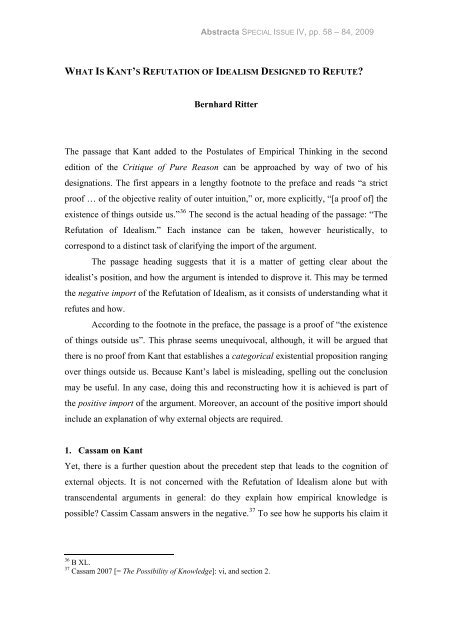Complete Issue in PDF - Abstracta
Complete Issue in PDF - Abstracta
Complete Issue in PDF - Abstracta
Create successful ePaper yourself
Turn your PDF publications into a flip-book with our unique Google optimized e-Paper software.
<strong>Abstracta</strong> SPECIAL ISSUE IV, pp. 58 – 84, 2009<br />
WHAT IS KANT’S REFUTATION OF IDEALISM DESIGNED TO REFUTE?<br />
Bernhard Ritter<br />
The passage that Kant added to the Postulates of Empirical Th<strong>in</strong>k<strong>in</strong>g <strong>in</strong> the second<br />
edition of the Critique of Pure Reason can be approached by way of two of his<br />
designations. The first appears <strong>in</strong> a lengthy footnote to the preface and reads “a strict<br />
proof … of the objective reality of outer <strong>in</strong>tuition,” or, more explicitly, “[a proof of] the<br />
existence of th<strong>in</strong>gs outside us.” 36 The second is the actual head<strong>in</strong>g of the passage: “The<br />
Refutation of Idealism.” Each <strong>in</strong>stance can be taken, however heuristically, to<br />
correspond to a dist<strong>in</strong>ct task of clarify<strong>in</strong>g the import of the argument.<br />
The passage head<strong>in</strong>g suggests that it is a matter of gett<strong>in</strong>g clear about the<br />
idealist’s position, and how the argument is <strong>in</strong>tended to disprove it. This may be termed<br />
the negative import of the Refutation of Idealism, as it consists of understand<strong>in</strong>g what it<br />
refutes and how.<br />
Accord<strong>in</strong>g to the footnote <strong>in</strong> the preface, the passage is a proof of “the existence<br />
of th<strong>in</strong>gs outside us”. This phrase seems unequivocal, although, it will be argued that<br />
there is no proof from Kant that establishes a categorical existential proposition rang<strong>in</strong>g<br />
over th<strong>in</strong>gs outside us. Because Kant’s label is mislead<strong>in</strong>g, spell<strong>in</strong>g out the conclusion<br />
may be useful. In any case, do<strong>in</strong>g this and reconstruct<strong>in</strong>g how it is achieved is part of<br />
the positive import of the argument. Moreover, an account of the positive import should<br />
<strong>in</strong>clude an explanation of why external objects are required.<br />
1. Cassam on Kant<br />
Yet, there is a further question about the precedent step that leads to the cognition of<br />
external objects. It is not concerned with the Refutation of Idealism alone but with<br />
transcendental arguments <strong>in</strong> general: do they expla<strong>in</strong> how empirical knowledge is<br />
possible? Cassim Cassam answers <strong>in</strong> the negative. 37 To see how he supports his claim it<br />
36 B XL.<br />
37 Cassam 2007 [= The Possibility of Knowledge]: vi, and section 2.




